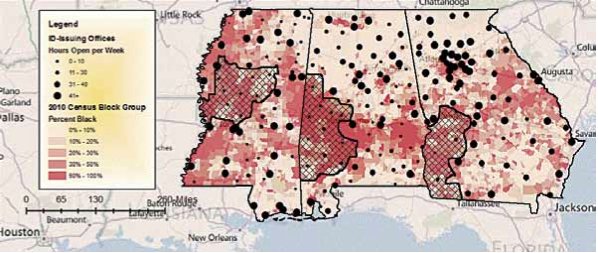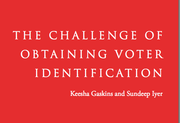Hours for voter identification offices could affect rural African American voters. Photo by Courtesy Brennen Center for Justice
JACKSON — Rural voters in Mississippi and surrounding states face increased voter-identification hurdles, and African American voters may be more affected than most.
The Brennan Center for Justice, a non-partisan public-policy legal institute, released a July 17 report warning that an estimated 48,329 Mississippians do not have access to a vehicle and live more than 10 miles from a state ID issuing office. One in every 20 voting-age citizens in the 10 states that voted for restrictive voter ID laws do not have access to a vehicle.
In the rural areas of Mississippi, Alabama and Georgia—what the Brennan Center calls the “black belt” due to so many black residents—many African American voters live a “significant distance” from voter ID offices. In addition, 13 “contiguous” counties in Mississippi have driver’s license offices open on a part-time basis. The Brennan Center found that county offices in Mississippi will provide IDs to citizens; however, because the U.S. Department of Justice has not cleared the voter ID law for this state, no information on how county offices will handle ID distribution is available.
In Alabama, Wisconsin and Mississippi, half the ID issuing offices are open five days a week, and none is open on weekends.
By comparison, Georgia has 21 contiguous counties that are also issuing IDs to African Americans in those counties. However, the Brennan Center found that those voters still face problems. “First, most county offices in Georgia do not print their business hours in an easily accessible location online, and some have even printed incorrect office addresses or phone numbers online,” the report says.
When the Brennan Center contacted county offices in Georgia, county officials could not provide accurate information on requirements to receive IDs.
“In 12 of the 21 county offices in the Georgia black belt, election officials could not correctly describe what forms of identification would be required to obtain a free photo ID,” the report states. For instance, officials in the Bartow and Sumter County offices said that applicants must show a Social Security card to obtain free ID, but the Georgia law has no such requirement.”
When asked to comment on the effect a voter ID law would have on blacks in rural areas in this state, Mississippi NAACP President Derrick Johnson declined because the ID law is not yet approved. He did say, however, that he believes “the Secretary of State’s office is deceiving the public when they present the idea that there will be a voter ID requirement in November, when the Department of Justice has not approved it, yet.”




Comments
Use the comment form below to begin a discussion about this content.